IP2Location vs. WhoisXML API vs. IPify: 3 Best IP Geolocation Services Compared

IP geolocation is an important source of intelligence with benefits in cybersecurity and marketing. Its use cases include cybercrime prevention, fraud detection, website traffic generation, and many others. Thus, it isn’t surprising to find out that a web search for the keyword “ip geolocation” would return millions of results, many of which include the service pages of some of the best IP geolocation / IP-to-location providers.
Yet with many options available, how would you know which one to choose? We did a comprehensive review of three IP geolocation vendors to answer this question.
What Is IP Geolocation / IP 2 Location?
IP geolocation, also known as IP 2 location or IP to location, is the process of mapping a geographic location to a given IP address. It is essentially what an IP geolocation solution or service does. Using an IP address as a query string, users can get its owner’s geographic location from the country down to the postal code level.
Check out this video for more information:
Some of the Best IP Geolocation Providers Compared
Vendor #1: WhoisXML API
WhoisXML API has been in business for more than a decade now. Its IP geolocation database contains information on over 27 million total unique ranges and more than 9.5 million IP netblocks, giving it a 99.5% coverage of all IP addresses in use. It also harnesses the power of the passive Domain Name System (DNS) to provide clients with connections from IP addresses to domain names over time.
Vendor #2: IP2Location
IP2Location is also 18 years old. It has more than 32 datasets that users can choose from and supports over 20 programming languages. Its IP geolocation database contains more than 4 billion IPv4 addresses and over 340 undecillion IPv6 addresses. To date, IP2Location has helped users make more than a billion API calls.
Vendor #3: IPify
IPify has been serving clients since 2014. The provider claims that its database also covers 99.5% of all IP addresses in use, with clients using its products for a variety of business purposes that include content personalization, digital marketing, access blocking, protection against cyber fraud, and security policy reinforcement.
5 Criteria to Find the Best IP Geolocation Service
Breadth, depth, variety of consumption models and adjacent sources of intelligence, pricing, and support and reputation are all important criteria to compare IP geolocation service providers.
1. Breadth: Number of Unique IP Addresses
Details on the breadth of IP geolocation providers’ database offerings are shown below.
- WhoisXML API: Close to 3.7 billion IPv4 addresses and undecillions of IPv6 addresses.
- IP2Location: Claiming to cover around 4.3 billion IPv4 addresses and undecillions of IPv6 addresses.
- IPify: The provider states that its database includes 99.5% of all IP addresses in use.
2. Depth: IP Geolocation Data Points
The number of geo data points covered varies per vendor.
- WhoisXML API: A total of 14 data points, namely:
- Country
- Region
- City
- Latitude and longitude coordinates
- Postal code
- Time zone
- GeoNames ID
- Connected domains (for shared IP addresses)
- Internet service provider (ISP)
- Connection type
- Autonomous System (AS) number
- Organization name
- AS route
- ISP domain
- Usage type
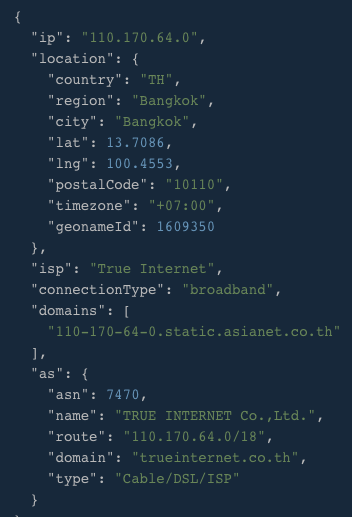
- IP2Location: A total of up to 24 data points (depending on data sets). These include 14 of WhoisXML API’s data points (i.e., country, region, city, latitude and longitude coordinates, postal code, time zone, GeoNames ID, ISP, connection type, AS number, organization name, AS route, ISP domain, and usage type) and the following:
- Country code
- International direct dialing (IDD) code
- Area code
- Weather station code
- Weather station name
- Mobile country code (MCC)
- Mobile network code (MNC)
- Mobile brand
- Elevation
- Credits consumed
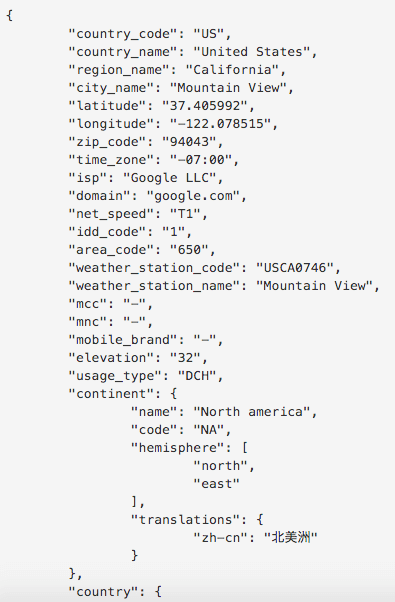
- IPify: A total of 13 data points included in WhoisXML API’s data points (i.e., country, region, city, latitude and longitude coordinates, postal code, time zone, GeoNames ID, connected domains, AS number, organization name, AS route, ISP domain, and usage type).
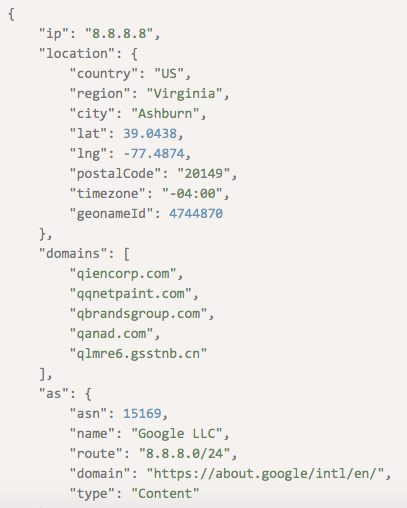
3. Consumption Models and Adjacent Sources of Intelligence
Among the four vendors, WhoisXML API has the most extensive product range.
WhoisXML API Products
WhoisXML API has a total of eight IP intelligence offerings, namely:
- IP Geolocation API and IP Geolocation Lookup: Apart from an IP address, IP Geolocation API allows users to search for geolocation information using a domain name or an email address as input. It provides results in either JavaScript Object Notation (JSON) or XML format. As such, it is integrable into most if not all compatible solutions or systems. Instructions for its use are available on the API Docs page. Developer libraries and code samples, meanwhile, can be downloaded from the Integrations page.
IP Geolocation Lookup is a web-based service version of IP Geolocation API. While it provides the same results, it does so in a format that even the not so tech-savvy can read. It also gives reports with custom URLs for easy sharing.
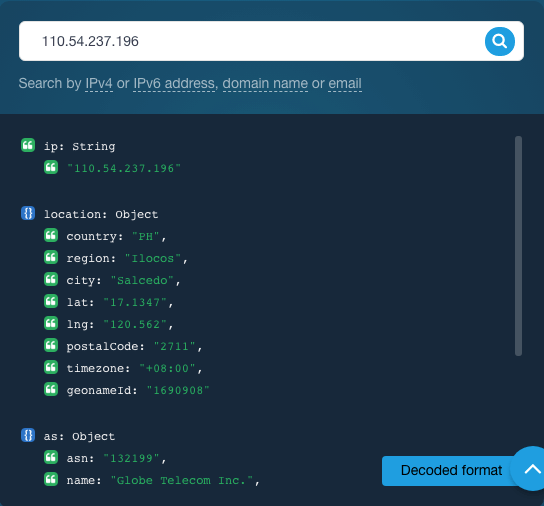
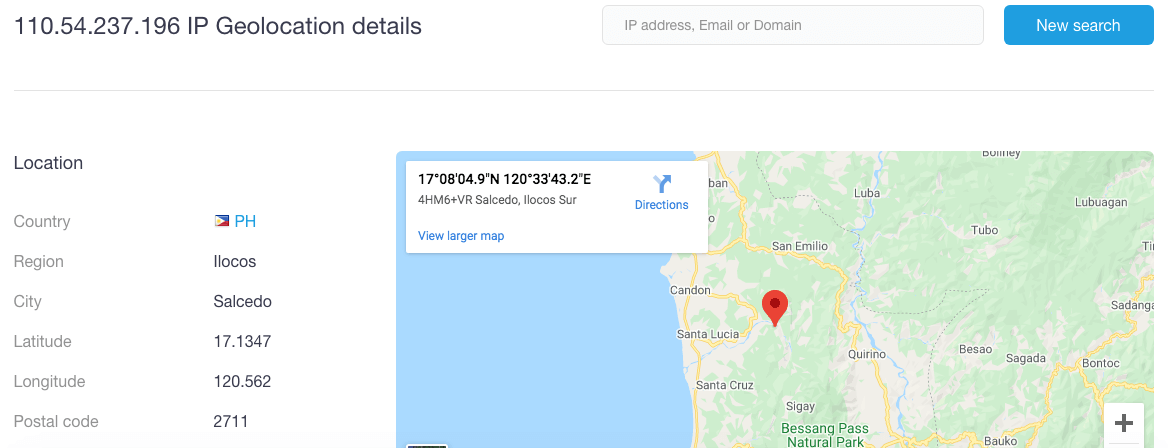
- IP Geolocation Data Feed: This is IP Geolocation API’s and IP Geolocation Lookup’s intelligence source. It contains data on 32 million IP blocks and locations and comes in JSON and comma-separated values (CSV) formats. More detailed instructions for downloading and integration is available on the Specifications page.
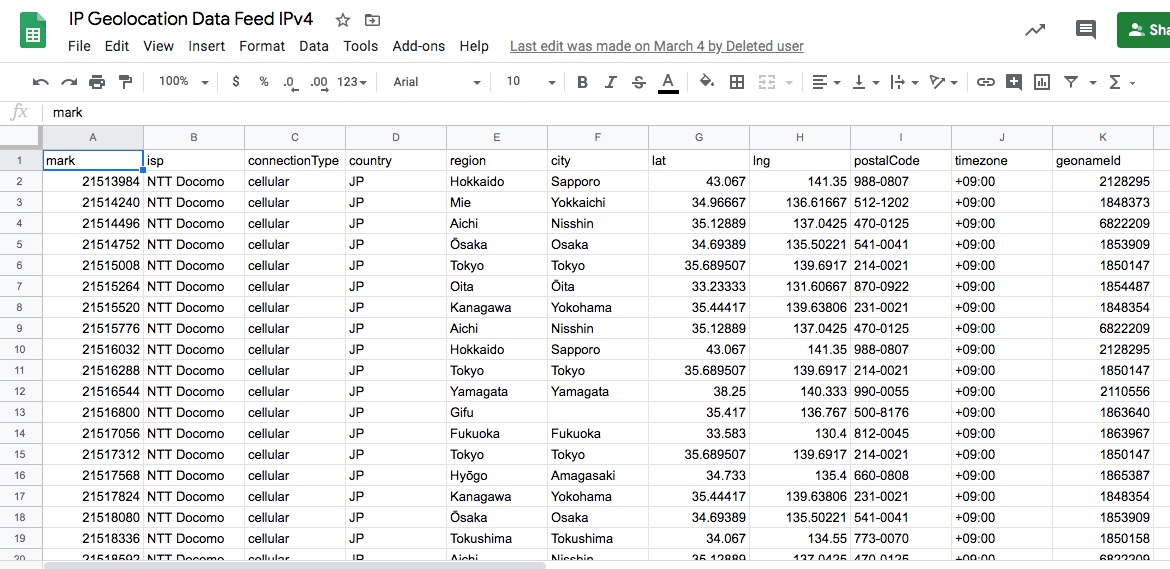
- IP Netblocks API and IP Netblocks Lookup: These adjacent sources of IP intelligence determine the IP range and netblock an IP address belongs to, along with detailed information on its owner.
The API gives results in JSON and XML formats, making it easily integrable into existing solutions and systems. Instructions for its use and integration is available on the API Docs page.
IP Netblocks Lookup, meanwhile, provides easy-to-read reports for the less tech-savvy. It also gives a custom URL for each report, making it easy for users to share.
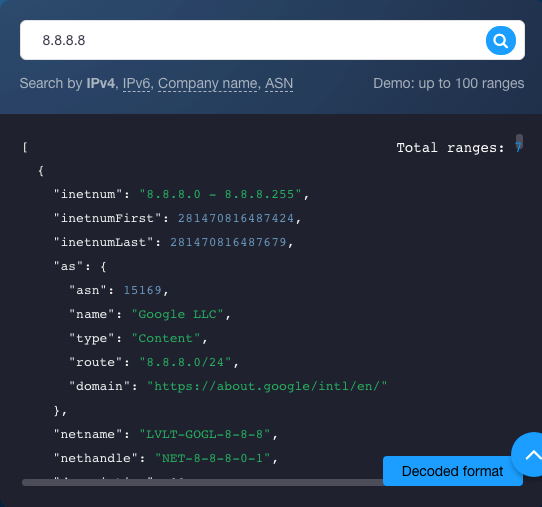
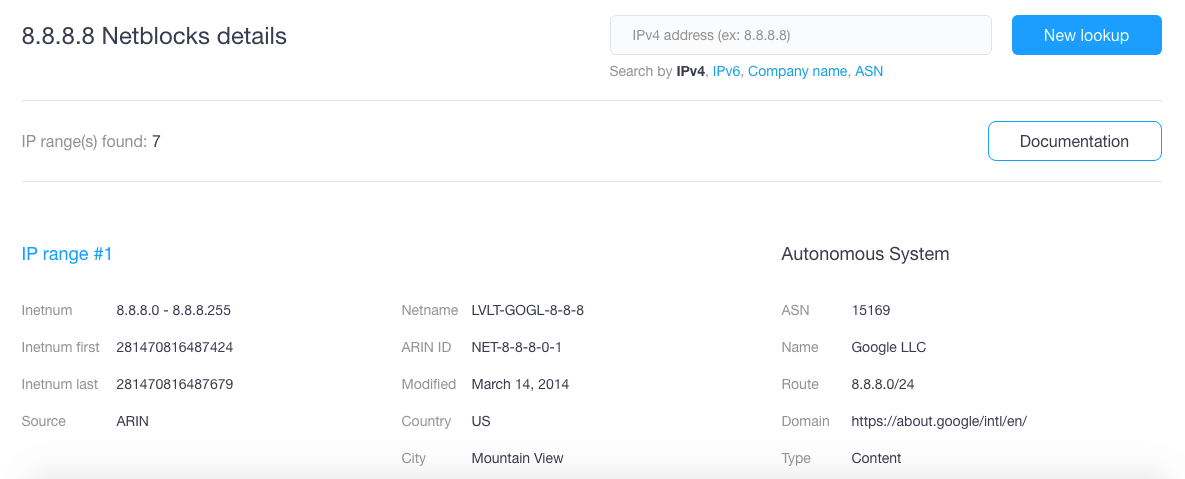
- IP Netblocks WHOIS Database: Like IP Netblocks API and IP Netblocks Lookup, the database lets users check the IP range and netblock of an IP address, along with detailed information on its owner. It’s available in two formats—JSON and CSV. Users can also choose to download the database in full or daily increments via HyperText Transfer Protocol Secure (HTTPS) or File Transfer Protocol (FTP). Detailed instructions for downloading are available on the Specifications page.
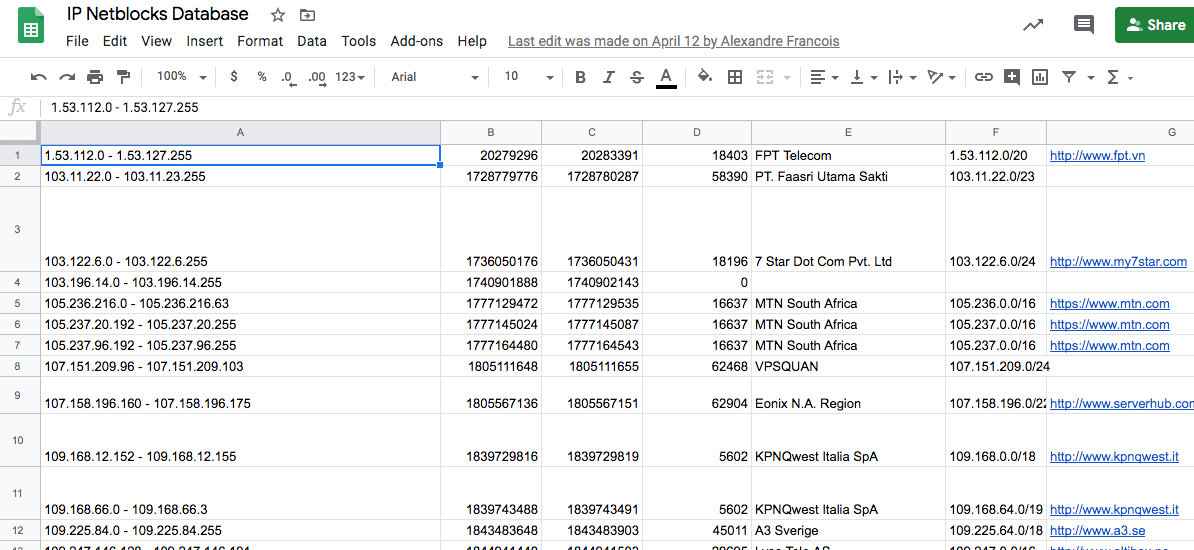
- Reverse IP/DNS API and Reverse IP/DNS Lookup: These other adjacent sources of IP intelligence allow users to obtain a list of all the domains that resolve to an IP address and when each resolution was first and last seen. They collect data from an extensive passive DNS database, making them useful for cybersecurity purposes.
The API returns results in JSON and XML formats, making them easy to integrate into platforms. Instructions for its use are available on the API Docs page. Code samples for various languages are also available on the Integrations page.
Reverse IP/DNS Lookup reports, meanwhile, are easy to read even for the non-tech-savvy. The service gives a custom URL for each report, making it easy to share too.
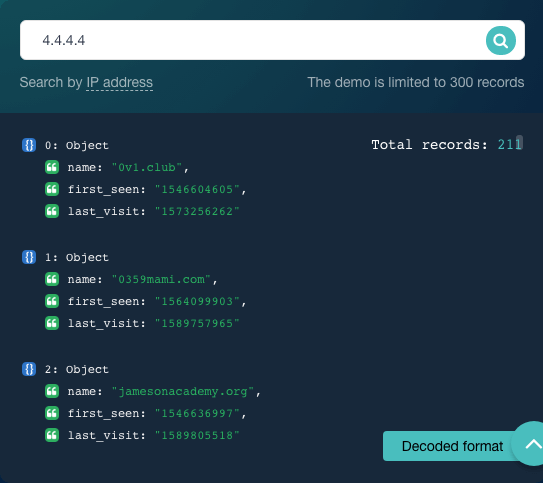
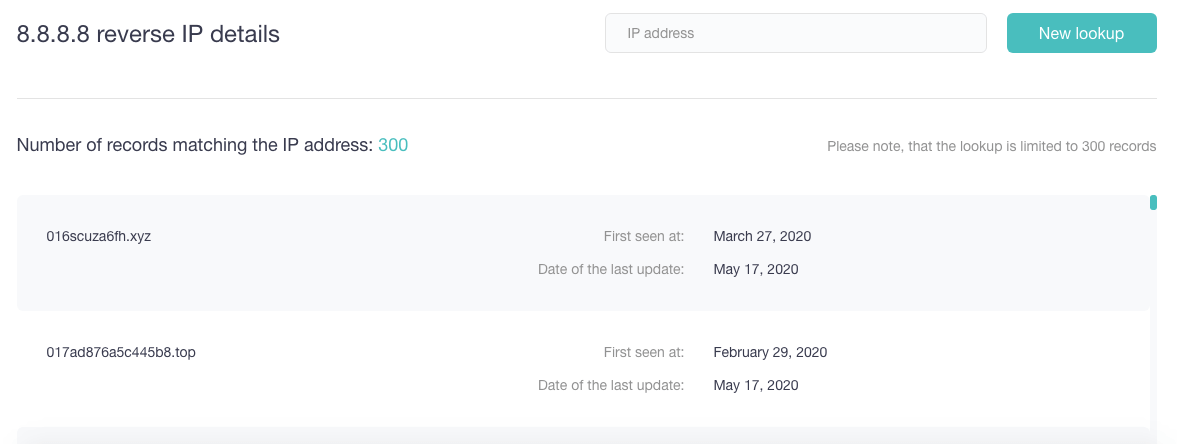
IP2Location Products
IP2Location has a total of three product lines, namely:
- IP Address Geolocation Database: These databases are available for download as either CSV or BIN files. They come in various kinds as well, depending on how much information is required.
- IP Geolocation Web Service: This allows users to query the database to retrieve geolocation information. A manual detailing instructions for its use, including sample query strings, can be accessed.
- Software and Components: IP2Location offers ready-to-use software, components, or libraries so users can integrate its products into their platforms or frameworks. These components don’t require one to set up a relational database, as they search for records directly from the vendor’s BIN data file.
There are four components on offer, namely:
- .NET Component: This is made for the .NET Framework and it enables users to perform IP geolocation lookups to determine their website visitors’ geolocation accurately.
- Java Component: This works with the Java platform and allows applications to discover where website visitors are coming from.
- ActiveX/COM DLL: This is a component for Windows systems that allows developers to determine where web visitors originate based on their IP addresses.
- HTTP Module: This is an Internet Information Services (IIS)-managed module that allows users to retrieve extensive information about an IP address.
IPify Products
IPify has two offerings, namely:
- IP Geolocation API: This lets users discover the physical location of an IP address via API calls. Like other previously cited services, the API is useful for various business requirements. Details on its use are available on the API Docs page.
- IP Geolocation Data Feed: This provides the same information as the API but in the format of a downloadable database. It contains detailed IP geolocation information gleaned from more than 30 million block records. The data feed comes in JSON format. Download instructions are available on the Specifications page.
4. Pricing
Here are some of the available purchase options and their pricing for each provider:
- WhoisXML API’s API pricing varies according to the number of queries and type of subscription. The provider offers 1000 free queries per month. Besides, for 1 million and 5 million queries, a one-time credit purchase would cost $179 and $549, respectively. The cost for 1 and 5 million queries goes down to $99 and $299 with a monthly plan, while yearly plans for these amounts of queries cost $990 and $2,990. Database pricing depends on the number of licenses and subscription type. A one-off license valid for 1 month costs $129. A monthly and yearly subscription for one license would cost $99 (per month) and $990 (per year) with discounts available for more sites licenses. Custom pricing is also available, including with Enterprise API and Enterprise Data Feed packages.
- The pricing of IP2Location’s IP Geolocation web service starts at $49 for 100,000 credits and goes up to $441 and $1,960 for 1 million and 5 million credits. The provider’s databases have a yearly pricing that changes based on the number of data points contained and type of licenses. The software components’ yearly costs start between $99 and $149.
- IPify also has pricing options with different consumption plans. API costs for one-off 1 and 10 million queries are $89 and $449. Comparatively, monthly and yearly subscriptions for 1 million / 10 million queries are worth $49 / $249 and $495 / $2,495. Database pricing also varies based on the number of site licenses starting with $99 for a one-time license valid one month.
5. Support and Reputation
All of the vendors on our comparison list provide support services with contact details, such as:
- WhoisXML API: All of the information users need to contact the vendor can be found on its Contact Us page.
- IP2Location: The contact details for the vendor can be found on its Contact page.
- IPify: This vendor can be contacted via a request form at the bottom of its site.
According to a Trustradius comparison of two of the vendors—WhoisXML API and IP2Location—WhoisXML API had the top score of 9.1 out of 10. Points that made WhoisXML API stand out include:
- It provided accurate and up-to-date information that was useful not only for marketing purposes but also for cybersecurity.
- The pros indicated for the products were similar.
- WhoisXML API scored high in terms of support provision and pricing, too.
---
Upon review of the three vendors one certainly wonders if there is such a thing as the best IP geolocation service provider. The short answer is no.
Each of our contenders—WhoisXML API, IP2Location and IPify—have pros and cons and particular offerings. The right choice will depend on an organization’s business needs and budget.



































